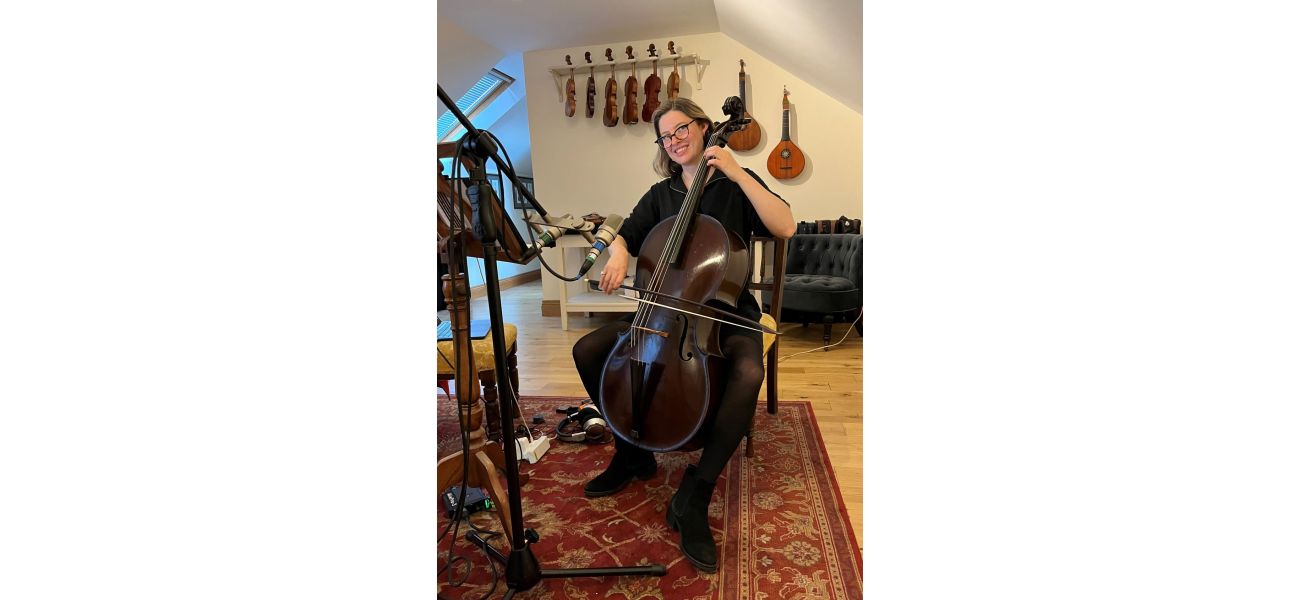An 18th century cello from Scotland, thought to be the oldest, will soon be played once again.
An 18th century Scottish cello has been revived and will be played again. It was created by Robert Duncan in 1756 and donated to the University of Aberdeen by former student James Beattie.
November 14th 2024.

A piece of Scottish history has been brought back to life as the oldest surviving Scottish cello is set to be played once again. The instrument, crafted by the skilled hands of luthier Robert Duncan in 1756, has been carefully restored and donated to the University of Aberdeen as part of a generous bequest from former student and professor of Philosophy, James Beattie. This remarkable donation not only includes the cello itself but also Beattie's papers, letters, and personal belongings, all of which have been carefully preserved by the University's Special Collections.
James Beattie, born in Laurencekirk, was a talented scholar who won a scholarship to study at Marischal College at just 14 years old. Despite pursuing a career as a schoolmaster, Beattie never lost his passion for knowledge and continued to study and publish poetry in his free time. It was in 1760 that he was appointed professor of Moral Philosophy at Marischal College, a position he held for the rest of his life.
Beattie's most famous work, An Essay on the Nature and Immutability of Truth, was published in 1770 and caused quite a stir in the philosophical world. In it, he boldly critiqued the ideas of renowned philosopher David Hume and passionately denounced his views on race and slavery. Beattie's strong stance on these issues gained him widespread recognition and even caught the attention of famous artist Sir Joshua Reynolds, who painted a portrait of Beattie as a champion of truth.
Aside from his intellectual pursuits, Beattie was also an amateur cellist and a member of the Aberdeen Musical Society. His love for music is evident in his prized possession, the cello crafted by Robert Duncan. This instrument, now fully restored by luthier and restorer David Rattray, is not only a testament to Beattie's love for music but also a valuable piece of Scottish history.
The cello, now in its pure baroque condition, will be played in public for the first time since the 18th century as part of the University of Aberdeen's concert series. Accompanied by early music group Scots Baroque, cellist Lucia Capellaro, along with László Rózsa, Aaron McGregor, and Alex McCartney, will bring the historic instrument to life once again.
Dr. Aaron McGregor, a lecturer in music performance, expressed his excitement for the upcoming performance, stating, "It is incredibly exciting to be able to hear Beattie's cello played in public probably for the first time since his lifetime, in the very appropriate setting of King's College Chapel." The concert will feature a repertoire of Italian sonatas, chamber music, and Scottish tunes, showcasing the diverse musical tastes of Beattie and his contemporaries.
Scots Baroque, known for their innovative programs and captivating performances, are the perfect ensemble to bring Beattie's cello to the stage. This one-of-a-kind concert is not to be missed, as it celebrates not only Beattie's love for music but also the rich cultural heritage of Scotland. Don't miss out on this unique opportunity to experience history through music. Subscribe to Scottish Field to stay updated on the latest news and stories.
James Beattie, born in Laurencekirk, was a talented scholar who won a scholarship to study at Marischal College at just 14 years old. Despite pursuing a career as a schoolmaster, Beattie never lost his passion for knowledge and continued to study and publish poetry in his free time. It was in 1760 that he was appointed professor of Moral Philosophy at Marischal College, a position he held for the rest of his life.
Beattie's most famous work, An Essay on the Nature and Immutability of Truth, was published in 1770 and caused quite a stir in the philosophical world. In it, he boldly critiqued the ideas of renowned philosopher David Hume and passionately denounced his views on race and slavery. Beattie's strong stance on these issues gained him widespread recognition and even caught the attention of famous artist Sir Joshua Reynolds, who painted a portrait of Beattie as a champion of truth.
Aside from his intellectual pursuits, Beattie was also an amateur cellist and a member of the Aberdeen Musical Society. His love for music is evident in his prized possession, the cello crafted by Robert Duncan. This instrument, now fully restored by luthier and restorer David Rattray, is not only a testament to Beattie's love for music but also a valuable piece of Scottish history.
The cello, now in its pure baroque condition, will be played in public for the first time since the 18th century as part of the University of Aberdeen's concert series. Accompanied by early music group Scots Baroque, cellist Lucia Capellaro, along with László Rózsa, Aaron McGregor, and Alex McCartney, will bring the historic instrument to life once again.
Dr. Aaron McGregor, a lecturer in music performance, expressed his excitement for the upcoming performance, stating, "It is incredibly exciting to be able to hear Beattie's cello played in public probably for the first time since his lifetime, in the very appropriate setting of King's College Chapel." The concert will feature a repertoire of Italian sonatas, chamber music, and Scottish tunes, showcasing the diverse musical tastes of Beattie and his contemporaries.
Scots Baroque, known for their innovative programs and captivating performances, are the perfect ensemble to bring Beattie's cello to the stage. This one-of-a-kind concert is not to be missed, as it celebrates not only Beattie's love for music but also the rich cultural heritage of Scotland. Don't miss out on this unique opportunity to experience history through music. Subscribe to Scottish Field to stay updated on the latest news and stories.
[This article has been trending online recently and has been generated with AI. Your feed is customized.]
[Generative AI is experimental.]
0
0
Submit Comment





